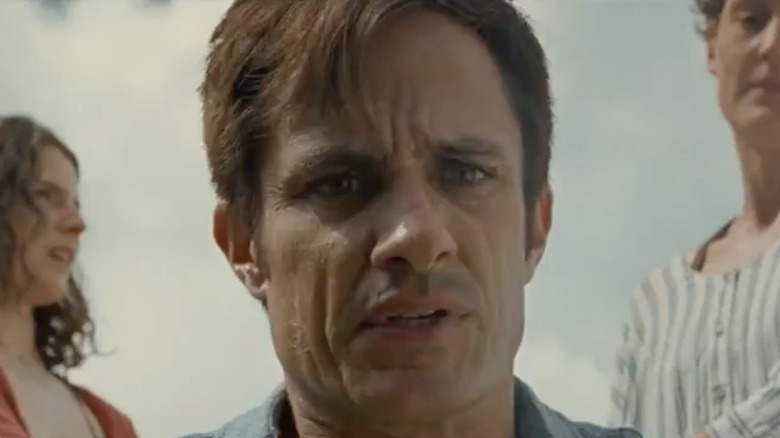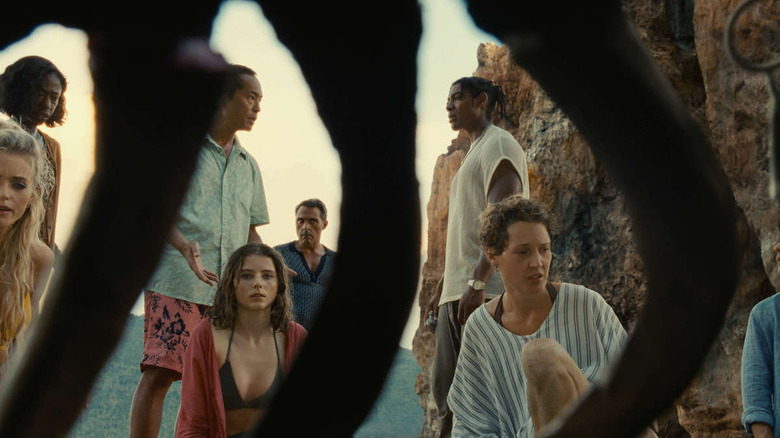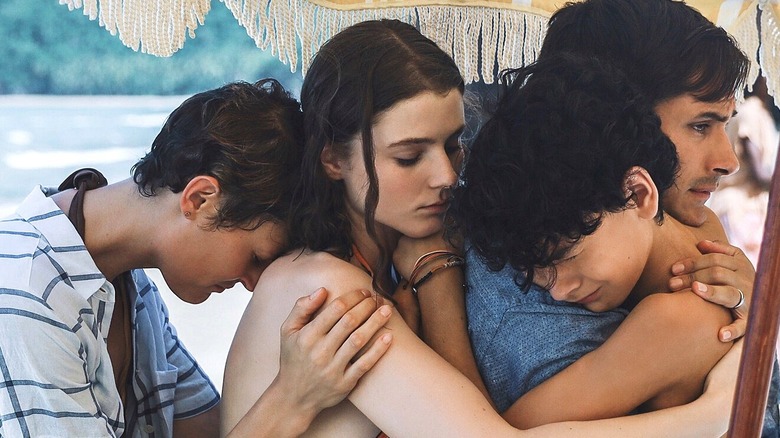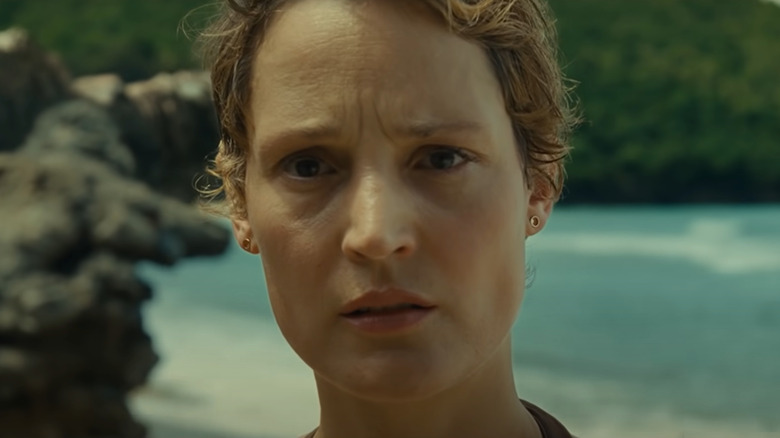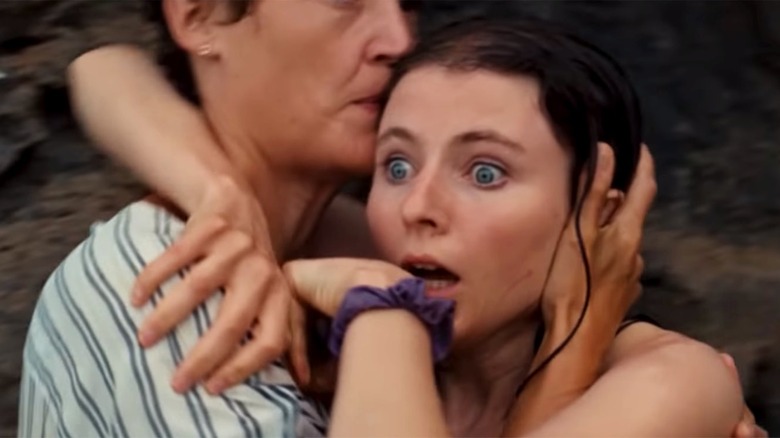Gael García Bernal Explains His Captivating Reason For Joining Old - Exclusive Interview
"Sandcastle," the graphic novel by Pierre Oscar Levy and Frederik Peeters, is a story about a group of people who find themselves trapped on a beach where time moves so unnaturally quickly that they will all be dead by the end of the day if they can't escape. It isn't hard to see why this story would connect with people after a year and a half's worth of COVID-19 quarantine.
And it's equally unsurprising, given the obvious emotional parallels between "Sandcastle" and the real world, that M. Night Shyamalan chose to adapt the story into the 2021 film "Old." The core of the story remains the same: people go to a small beach to get away from their day-to-say problems, only to be confronted by both their own mortality and their worst natures.
Of course, a live-action film hits a little differently than a comic book does — both for the audience and for the team crafting the film. For the actors involved, it was an opportunity to tell a relevant story, and maybe even use that story as a means to cope with the real world — and the experience was scary and unexpectedly funny as well.
Looper sat down to speak with actor Gael García Bernal to find out what it was like playing one half of a couple in the midst of falling apart, what makes working with Night such an exciting prospect, and the surprising places where "Old" provided Bernal with both joy and fear.
Old and its connection to the real world
"Old" makes a lot of sense coming out now, because the characters are trapped in a space and dying and if you look at the last year and a half, it's very obvious why people would feel a connection to this story immediately — but I'm curious as to what it was that made you feel a connection to this story.
Well, there were many, many things that, made me want to be part of this. First of all, the idea of reading for a film that [M.] Night [Shyamalan] was going to direct came at a very specific moment of huge uncertainty during the pandemic. It was in June more or less of last year. So at that point, nothing was certain of when things were going to start, so just the idea of it was exciting already — and then when I heard what it was going to happen, it was going to be on a beach and, and it was going to be with Vicky Krieps as well.
I was like, "Oh man, I want to do this. I hope that they choose me to do this." And when I was invited to be part of it and read the script, it made complete sense. There's something about this, this looking into a story and the all the points that you grab on that excite you to want to do it, that all of a sudden it becomes almost like a necessity. An exciting necessity that, it makes complete sense. There was no one thing that kind of attracted me to it, but I would say just the idea of working with Night at the beginning, because that was the first thing that I heard of.
Night jokes on set to keep things light
What was it like working with Night?
Night is someone that obviously has a lot of experience, he's been working a lot and developing many things and creating a very strong scheme or a structure for his films. Then this one where there was a very clear idea of point A and point B, of where he wanted each shot to go to or where each scene or sequence to travel to. But as always putting things together and putting them at play, at that point, you start to adapt them, or try to find out how to do it.
How to go from point A to point B, and there were many difficulties. I wouldn't say difficulties, but many limitations that were natural, like shooting on the beach, shooting chronologically with the light coming in from one side to the other and everything spanning in a period of one day. And the tides as well made it kind of hard to put our head around it on how to do it, but we just started to rehearse and we started to play around with it. We started to create and grab, an ownership of the characters, started to see the alchemy that was growing up with the actors, and Night was very good at holding us there, and finding out the sense of this film and as well, making us have a really good time.
We laughed a lot while doing the film, we had a really, really fun time, even though it's a big metaphysical thriller. I mean, whenever they said "cut," we would have a laugh, a lot, we would enjoy it.
Was there anything that Night did to keep things light, to make it funny in the midst of all the tension? Was there anything in particular?
Yeah. Making jokes, yeah. You step aside a little bit from what we're doing and everything is so serious, and all of a sudden you'll see the farcical elements of what we're doing and it's fun, you know? And he's a person that appreciates a sense of humor.
Working (and cooking) with Vicky Krieps
You mentioned being excited to work with Vicky Krieps. How did you work together to build this relationship between your characters Guy and Prisca?
We were neighbors in the hotel that we were staying [in while filming] and we shared the garden. So we would spend a lot of time talking and cooking and just wondering about how we were going to do this film and building up the backstory of the characters, more or less creating a kind of, all these things that you normally do to grab an ownership of characters. We started to put it together and the good thing is that I think she also knew, I wouldn't speak for her, but I knew that we would get along really well. Ever since I saw her in "The Phantom Thread," which is the film that most people saw her in the first time, I was like, "Oh man, I wish I would work with her and, and I'm sure we would get on really well." And it happened — we became instant best friends. I mean, what's so nice about these movies is that I gained another really amazing friend for life.
When we talked with Vicky, she talked about how ultimately helpful she found the old age makeup to be in the process. How was that for you?
Oh, it was the best because it's literally a mask that we put on and that mask gives you so much. It's the elemental origin of theater putting on a mask and seeing the truth behind the mask. So there were many ways that it helped us a lot, and it was also amazing makeup, and, regardless of the time that it took to put on, it was so well done that we didn't have to do touchups. We didn't have to wait almost, we didn't feel it, it was there and we didn't feel it at all, it was incredible. It was amazing, the old age makeup, it really incorporated into our faces. It was really nice.
The scariest part of Old
What is the scariest thing about this movie for you? Is it just the idea of mortality or is it something else?
For me, it's all of a sudden losing control of time. That is incredibly scary, and if we think about it, that's the most scary thing that can happen to anyone. Like it's all of a sudden time travels, either faster or slower, but you have no understanding of how that goes. And that is really complicated. That is something that is like, whoa, you can't believe it. So that for me is the most scary thing. Yeah.
Rufus Sewell is playing this character who, once he feels like he's in the trap, his worst trait that comes out immediately is that he is a bigot. What do you think is that worst trait for Guy?
I think for Guy it's the fact that he is ... it's interesting because applied mathematics like actuaries do, it is a very empiric concept and that can transcend into your life. Statistics. It's like what big data in a way is doing. It's this thing of, this works this way, because this is a constant and understanding that. But obviously that [only] works if there is a unifying logic in the universe, which is that time travels at a certain way for everybody. But when that gets lost, then Guy gets completely out of control of everything and there's no logic that can make him understand what's going on. So he is like exactly the wrong person that this can happen to, the worst person that this can happen to, but at the same time, we see an outcome and something different that occurs because of that, and that's what's kind of interesting.
